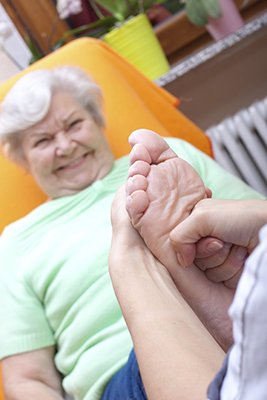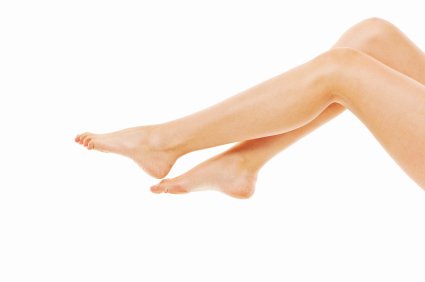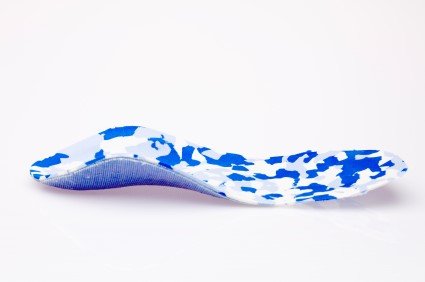
Lansdowne, PA
(610) 626-3338

Lansdowne, PA
(610) 626-3338
 For people with diabetes, a wound on the foot can be a very serious issue. Diabetes increases the risk for chronic or non-healing wounds, because of poor circulation. People who have had diabetes for over eight years are more likely to suffer nerve damage that makes it very hard to even notice an existing injury. It is important for people with diabetes to perform a daily foot examination, and to properly take care of minor wounds at home. If any kind of wound is discovered, major or minor, consulting with a doctor is recommended.
For people with diabetes, a wound on the foot can be a very serious issue. Diabetes increases the risk for chronic or non-healing wounds, because of poor circulation. People who have had diabetes for over eight years are more likely to suffer nerve damage that makes it very hard to even notice an existing injury. It is important for people with diabetes to perform a daily foot examination, and to properly take care of minor wounds at home. If any kind of wound is discovered, major or minor, consulting with a doctor is recommended.
Diabetic foot care is important in preventing foot ailments such as ulcers. If you are suffering from diabetes or have any other concerns about your feet, contact Dr. George Yarnell of Pennsylvania. Our doctor will treat your foot and ankle needs.
Diabetic Foot Care
Diabetes affects millions of people every year. Diabetes can damage blood vessels in many parts of the body, including the feet. Because of this, taking care of your feet is essential if you have diabetes, and having a podiatrist help monitor your foot health is highly recommended.
The Importance of Caring for Your Feet
Patients with diabetes should have their doctor monitor their blood levels because blood sugar levels play such a huge role in diabetic care. Monitoring these levels on a regular basis is highly advised.
It is always best to inform your healthcare professional of any concerns you may have regarding your feet, especially for diabetic patients. Early treatment and routine foot examinations are keys to maintaining proper health, especially because severe complications can arise if proper treatment is not applied.
If you have any questions please feel free to contact our office located in Lansdowne, PA. We offer the newest diagnostic and treatment technologies for all your foot and ankle needs.
 As winter approaches, we all know how important it is to make sure to keep our skin from getting too dry. Just as we use balms and moisturizers for our face and hands, there are many ways to protect against dry and cracked feet and heels. Glycerin lotions are some of the best remedies for combatting dryness. Hydrogenated oils are also very effective moisturizers, and can be used not only on your feet, but your ankles and legs too. In addition, fruits such as bananas and pineapples have plentiful amounts of helpful enzymes to ensure smooth and crack-free feet and ankles.
As winter approaches, we all know how important it is to make sure to keep our skin from getting too dry. Just as we use balms and moisturizers for our face and hands, there are many ways to protect against dry and cracked feet and heels. Glycerin lotions are some of the best remedies for combatting dryness. Hydrogenated oils are also very effective moisturizers, and can be used not only on your feet, but your ankles and legs too. In addition, fruits such as bananas and pineapples have plentiful amounts of helpful enzymes to ensure smooth and crack-free feet and ankles.
Cracked heels are unsightly and can cause further damage to your shoes and feet. If you have any concerns, contact Dr. George Yarnell of Pennsylvania. Our doctor will assist you with all your podiatric concerns.
Cracked Heels
Cracked heels are unappealing, and make it harder for you walk around in sandals. Not only may they look bad, but they can also tear stockings, socks, and wear out your shoes. There are several methods to help restore a cracked heel and prevent further damage.
How do you get them?
Dry skin is the number one culprit in creating cracked heels. Many athletes, walkers, joggers, and even swimmers suffer from cracked heels. Age and skin oil production play a role to getting cracked heels as well.
Promote Healing
Over the counter medicines can help, especially for those that need instant relief, or who suffer from chronic dry feet.
Wear Socks – wearing socks with medicated creams, helps lock in moisture so it can stay on longer.
Moisturizers – applying it both day and night will help alleviate dryness which causes cracking.
Pumice Stones – these remove dead skin, and then you can massage cream onto your foot. This way the cream will be absorbed. The skin needs to be exfoliated; therefore, the outer layer dead skin needs removal.
Change in Diet
Eating healthy, with a well-balanced diet, will give the skin a fresh and radiant look. Your body responds to what kinds of food you ingest. Omega-3 fatty acids and zinc supplements will also help with skin tissue.
Most importantly seek a health professional for foot care if something is wrong or doesn’t seem to be working. A podiatrist will help you with any questions or information needed.
If you have any questions please feel free to contact our office located in Lansdowne, PA. We offer the newest diagnostic and treatment technologies for all your foot and ankle needs.
 For over a decade, runner Cheryl Hile, who suffers from Multiple Sclerosis (MS), has trained to take part in the Paralympics. Hile, 42, who was diagnosed in 2006, has trained to complete seven marathons on seven continents in one year, with the use of orthotics. She will be the first person with MS to ever complete these races. Hile met Dr. Ara Mirzaian about a year after her diagnosis, where she was fitted for the best brace and ankle foot orthotic (AFO) available at the time. To combat some of Hile’s ailments, Dr. Mirzaian examines and adjusts her orthotics on a consistent basis to make sure all of the pieces work together correctly. Because of this, Hile has been able to lead an active life and reach her dreams of being a marathon-runner.
For over a decade, runner Cheryl Hile, who suffers from Multiple Sclerosis (MS), has trained to take part in the Paralympics. Hile, 42, who was diagnosed in 2006, has trained to complete seven marathons on seven continents in one year, with the use of orthotics. She will be the first person with MS to ever complete these races. Hile met Dr. Ara Mirzaian about a year after her diagnosis, where she was fitted for the best brace and ankle foot orthotic (AFO) available at the time. To combat some of Hile’s ailments, Dr. Mirzaian examines and adjusts her orthotics on a consistent basis to make sure all of the pieces work together correctly. Because of this, Hile has been able to lead an active life and reach her dreams of being a marathon-runner.
If you are having discomfort in your feet and would like to try orthotics, contact Dr. George Yarnell of Pennsylvania. Our doctor will assist you with all your podiatric concerns.
What are Orthotics?
Orthotics are inserts you can place into your shoes to help with a variety of foot problems such as flat feet or foot pain. Orthotics provide relief and comfort for minor foot and heel pain, but can’t correct serious biomechanical problems in your feet.
Over-the-Counter Inserts
Orthotics come in a wide variety of over-the-counter inserts that are used to treat foot pain, heel pain, and minor problems. For example, arch supports can be inserted into your shoes to help correct over arched or flat feet, while gel insoles are often used because they provide comfort and relief from foot and heel pain by alleviating pressure.
Prescription Orthotics
If over-the-counter inserts don’t work for you, or if you have a more severe foot issue, it is possible to have your podiatrist prescribe custom orthotics. These high quality inserts are designed to treat problems such as abnormal motion, plantar fasciitis, and more severe heel pain. They can even be used to help patients suffering from diabetes by treating foot ulcers and painful calluses, and are usually molded to your feet individually, which allows them to provide full support and comfort.
If you are experiencing minor to severe foot or heel pain, it’s recommended to speak with your podiatrist on the possibilities of using orthotics. A podiatrist can determine which type of orthotic is right for you and allow you to take the first steps towards being pain free.
If you have any questions please feel free to contact our office located in Lansdowne, PA. We offer the newest diagnostic and treatment technologies for all your foot and ankle needs.